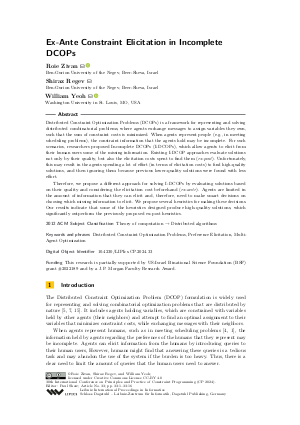Ex-Ante Constraint Elicitation in Incomplete DCOPs
Authors
Roie Zivan  ,
Shiraz Regev,
William Yeoh
,
Shiraz Regev,
William Yeoh 
-
Part of:
Volume:
30th International Conference on Principles and Practice of Constraint Programming (CP 2024)
Part of: Series: Leibniz International Proceedings in Informatics (LIPIcs)
Part of: Conference: International Conference on Principles and Practice of Constraint Programming (CP) - License:
 Creative Commons Attribution 4.0 International license
Creative Commons Attribution 4.0 International license
- Publication Date: 2024-08-29
File

PDF
LIPIcs.CP.2024.33.pdf
- Filesize: 1.2 MB
- 16 pages
Document Identifiers
Subject Classification
ACM Subject Classification
- Theory of computation → Distributed algorithms
Keywords
- Distributed Constraint Optimization Problems
- Preference Elicitation
- Multi-Agent Optimization
Metrics
- Access Statistics
-
Total Accesses (updated on a weekly basis)
0PDF Downloads0Metadata Views
Abstract
Distributed Constraint Optimization Problems (DCOPs) is a framework for representing and solving distributed combinatorial problems, where agents exchange messages to assign variables they own, such that the sum of constraint costs is minimized. When agents represent people (e.g., in meeting scheduling problems), the constraint information that the agents hold may be incomplete. For such scenarios, researchers proposed Incomplete DCOPs (I-DCOPs), which allow agents to elicit from their human users some of the missing information. Existing I-DCOP approaches evaluate solutions not only by their quality, but also the elicitation costs spent to find them (ex-post). Unfortunately, this may result in the agents spending a lot of effort (in terms of elicitation costs) to find high-quality solutions, and then ignoring them because previous lower-quality solutions were found with less effort. Therefore, we propose a different approach for solving I-DCOPs by evaluating solutions based on their quality and considering the elicitation cost beforehand (ex-ante). Agents are limited in the amount of information that they can elicit and, therefore, need to make smart decisions on choosing which missing information to elicit. We propose several heuristics for making these decisions. Our results indicate that some of the heuristics designed produce high-quality solutions, which significantly outperform the previously proposed ex-post heuristics.
Cite As Get BibTex
Roie Zivan, Shiraz Regev, and William Yeoh. Ex-Ante Constraint Elicitation in Incomplete DCOPs. In 30th International Conference on Principles and Practice of Constraint Programming (CP 2024). Leibniz International Proceedings in Informatics (LIPIcs), Volume 307, pp. 33:1-33:16, Schloss Dagstuhl – Leibniz-Zentrum für Informatik (2024)
https://doi.org/10.4230/LIPIcs.CP.2024.33
BibTex
@InProceedings{zivan_et_al:LIPIcs.CP.2024.33,
author = {Zivan, Roie and Regev, Shiraz and Yeoh, William},
title = {{Ex-Ante Constraint Elicitation in Incomplete DCOPs}},
booktitle = {30th International Conference on Principles and Practice of Constraint Programming (CP 2024)},
pages = {33:1--33:16},
series = {Leibniz International Proceedings in Informatics (LIPIcs)},
ISBN = {978-3-95977-336-2},
ISSN = {1868-8969},
year = {2024},
volume = {307},
editor = {Shaw, Paul},
publisher = {Schloss Dagstuhl -- Leibniz-Zentrum f{\"u}r Informatik},
address = {Dagstuhl, Germany},
URL = {https://drops.dagstuhl.de/entities/document/10.4230/LIPIcs.CP.2024.33},
URN = {urn:nbn:de:0030-drops-207182},
doi = {10.4230/LIPIcs.CP.2024.33},
annote = {Keywords: Distributed Constraint Optimization Problems, Preference Elicitation, Multi-Agent Optimization}
}
Author Details
Funding
This research is partially supported by US-Israel Binational Science Foundation (BSF) grant #2022189 and by a J.P. Morgan Faculty Research Award.
References
-
Ferdinando Fioretto, Enrico Pontelli, and William Yeoh. Distributed constraint optimization problems and applications: A survey. Journal of Artificial Intelligence Research, 61:623-698, 2018.

-
Katsutoshi Hirayama and Makoto Yokoo. Distributed partial constraint satisfaction problem. In Proceedings of the International Conference on Principles and Practice of Constraint Programming (CP), pages 222-236, 1997.

-
Tiep Le, Atena M. Tabakhi, Long Tran-Thanh, William Yeoh, and Tran Cao Son. Preference elicitation with interdependency and user bother cost. In Proceedings of the International Conference on Autonomous Agents and Multiagent Systems (AAMAS), pages 1459-1467, 2018.

-
Rajiv Maheswaran, Jonathan Pearce, and Milind Tambe. Distributed algorithms for DCOP: A graphical game-based approach. In Proceedings of the International Conference on Parallel and Distributed Computing Systems (PDCS), pages 432-439, 2004.

-
Pragnesh J. Modi, Wei-Min Shen, Milind Tambe, and Makoto Yokoo. ADOPT: Asynchronous distributed constraint optimization with quality guarantees. Artificial Intelligence, 161(1-2):149-180, 2005.

-
Arnon Netzer, Alon Grubshtein, and Amnon Meisels. Concurrent forward bounding for distributed constraint optimization problems. Artificial Intelligence, 193:186-216, 2012.

-
Adrian Petcu and Boi Faltings. A scalable method for multiagent constraint optimization. In Proceedings of the International Joint Conference on Artificial Intelligence (IJCAI), pages 1413-1420, 2005.

-
Ben Rachmut, Roie Zivan, and William Yeoh. Communication-aware local search for distributed constraint optimization. Journal of Artificial Intelligence Research, 75:637-675, 2022.

-
Siddharth Sharma, Simone Sharma, and Anidhya Athaiya. Activation functions in neural networks. International Journal of Engineering Applied Sciences and Technology, 4(12):310-316, 2020.

-
Atena M. Tabakhi, Tiep Le, Ferdinando Fioretto, and William Yeoh. Preference elicitation for DCOPs. In Proceedings of the International Conference on Principles and Practice of Constraint Programming (CP), pages 278-296, 2017.

-
Atena M. Tabakhi, Yuanming Xiao, William Yeoh, and Roie Zivan. Branch-and-bound heuristics for incomplete DCOPs. In Proceedings of the International Conference on Autonomous Agents and Multiagent Systems (AAMAS), pages 1677-1679, 2021.

-
Atena M. Tabakhi, William Yeoh, and Roie Zivan. Incomplete distributed constraint optimization problems: Model, algorithms, and heuristics. In Proceedings of the International Conference on Distributed Artificial Intelligence (DAI), pages 64-78, 2021.

-
William Yeoh, Ariel Felner, and Sven Koenig. BnB-ADOPT: An asynchronous branch-and-bound DCOP algorithm. Journal of Artificial Intelligence Research, 38:85-133, 2010.

-
William Yeoh, Pradeep Varakantham, Xiaoxun Sun, and Sven Koenig. Incremental DCOP search algorithms for solving dynamic DCOP problems. In Proceedings of the International Conference on Web Intelligence and Intelligent Agent Technology (WI-IAT), pages 257-264, 2015.

-
Weixiong Zhang, Guandong Wang, Zhao Xing, and Lars Wittenburg. Distributed stochastic search and distributed breakout: Properties, comparison and applications to constraint optimization problems in sensor networks. Artificial Intelligence, 161(1-2):55-87, 2005.

-
Roie Zivan and Amnon Meisels. Message delay and DisCSP search algorithms. Annals of Mathematics and Artificial Intelligence, 46:415-439, October 2006.

-
Roie Zivan, Steven Okamoto, and Hilla Peled. Explorative anytime local search for distributed constraint optimization. Artificial Intelligence, 212:1-26, 2014.

